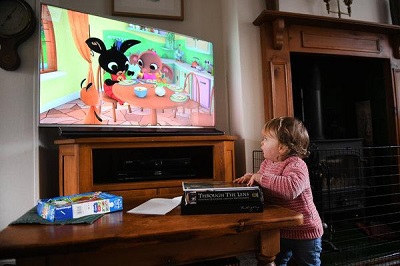Babies and toddlers should not be left to passively watch TV or other screens, according to new World Health Organization guidelines.
Sedentary screen time, including computer games, should not happen before a child is two, the WHO says.
The limit for two- to four-year-olds is an hour a day and less is better.
The UK has no plans to update its own advice on screen use, which sets no time limits, although it says children should avoid screens before bedtime, according to BBC.
The UK’s Royal College of Paediatrics and Child Health insists there is little evidence screen use for children is harmful in itself.
‘Worry less’ about children’s screen use
Screen time may harm toddlers
The new WHO advice focuses on passive viewing – youngsters being placed in front of a TV or computer screen or handed a tablet or mobile phone for entertainment – and is aimed at tackling child inactivity, a leading risk factor for global mortality and obesity-related ill health.
It is the first time the WHO has made recommendations on physical activity, sedentary behaviour and sleep for children under five.
As well as warning against passive screen time, it says babies should not spend longer than an hour at a time strapped into a buggy, car seat or sling.
The guidelines presented at the European Congress on Obesity.
The advice for babies:
Be physically active several times a day, including at least 30 minutes’ “tummy time” – lying on their front
No sedentary screen time
14-17 hours’ sleep a day, including naps, for newborns – reducing to 12-16 by four to 11 months
Should not be restrained (seat or sling) for more than an hour at a time
– For one- and two-year-olds:
At least three hours’ physical activity a day
No sedentary screen time for one-year-olds and less than an hour for two-year-olds
11-14 hours’ sleep a day, including naps
Should not be restrained for more than an hour at a time or sit for extended periods of time
– For three- and four-year-olds:
At least three hours’ physical activity a day, including at least one of moderate or vigorous intensity
Up to an hour of sedentary screen time – less is better
10-13 hours’ sleep a day, which may include a nap
Should not be restrained for more than an hour at a time or sit for extended periods of time
The WHO advice is based on available evidence, but there is still a lack of definitive research into the harms and possible benefits of screen use.
However, it was unlikely very young children gained from passive, sedentary viewing, said one of the guideline authors, Dr Juana Willumsen.
“Sedentary time should be made into quality time. Reading a book with your child, for example, can help them develop their language skills.
“A child who is given a tablet to keep them quiet while they are sitting in a pushchair is not getting the same [quality sedentary time].
Some TV programmes that encouraged young children to move about while viewing might be OK, she added, particularly if the parent or caregiver was also present to explain and join in.
H.Z

